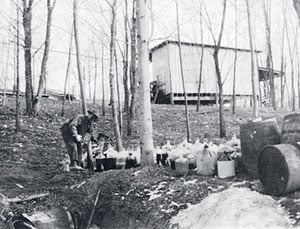
4825 Glenbrook Finishing Ceremony Concludes 28-Year Spring Valley Remediation
We frequently say that Parsons creates a safer world – and on November 23rd, Project Manager Sean Buckley represented Parsons in celebrating a safer Washington DC.
The finishing ceremony at 4825 Glenbrook in the suburban Spring Valley neighborhood marks the end of a quest we’ve pursued since 1993, when the US Army Corps of Engineers began to systematically investigate and remediate a former World War I chemical weapons research and testing site located in what now encompasses approximately 1,600 private properties, including several embassies and foreign properties, as well as the American University and Wesley Seminary.
During World War I, the American University Experimentation Station was the largest chemical weapons research site in the United States, and it produced the most lethal chemical weapons available at the time. After developing chemical warfare material, the Army tested them in the fields and hillsides below – an area the soldiers called Death Valley. After the war, the research facility was disassembled, waste was decontaminated and buried, and several years later, it was redeveloped under the name Spring Valley.
A 1993 discovery of buried military ordnance led to investigating the area’s past use, and that’s where we came into the story. As program manager, we led the site investigation and remediation covering 1,200 residential properties, with the most extensive activity at two locations:

- A disposal pit was found in the garden of the South Korean ambassador’s home.
- 4825 Glenbrook was where the Hole of Hades was located. The 1918 photo shows the chemical agent disposal pit with mustard agent containers to be buried there, with a notation on the back referencing the Hole of Hades. The 3-story home built on this site was demolished, and the site was excavated within a high-tech enclosure to prevent chemical agents from escaping into the neighborhood.
Across the full investigation site, our team remediated additional chemical warfare material and related artifacts, including military munitions. And always, safety for workers and residents was paramount.
In looking back, some of Sean’s most memorable moments involved the people – but one memory involved a furry visitor:
“The time we sheltered in place because a black bear was roaming the neighborhood!”
“Working with the neighborhood to minimize the impact to residents.”
“Shoveling snowy driveways and sidewalks when needed for those who could not, as good neighbors do.”
What’s next for this team of everyday superheroes? Our success on this program contributed to the next mission: a recently awarded $1.1B MATOC for USACE Huntsville District to protect the public and the environment by identifying and recovering munitions at new locations.